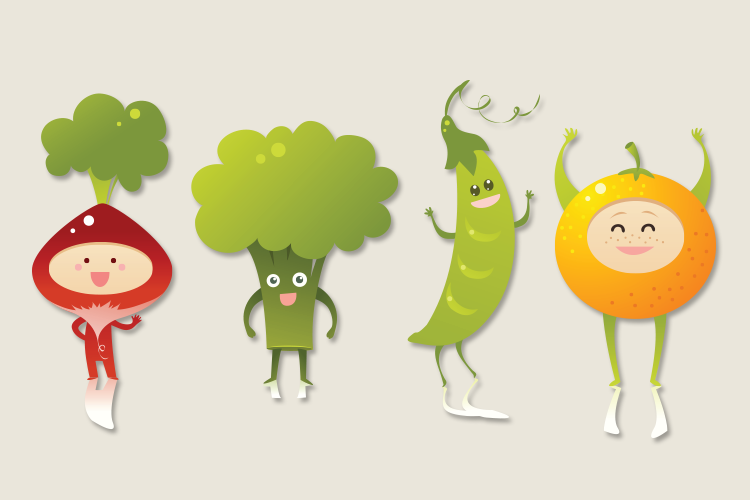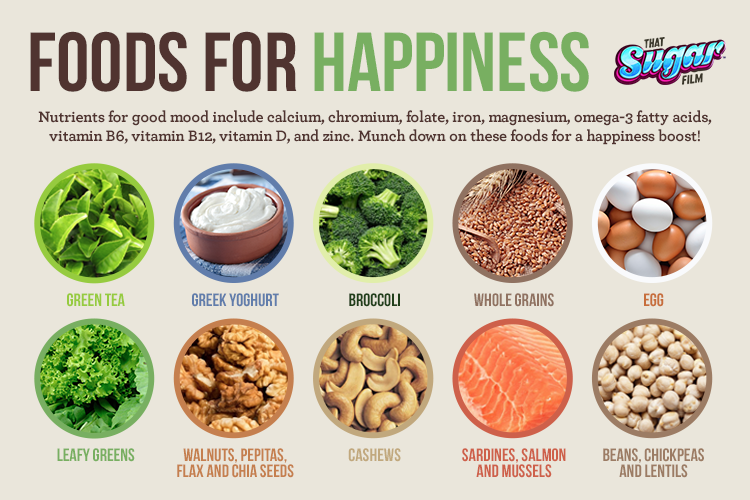Blog
Foods to boost happiness!
 We have all been partial to a bag of crisps, or a packet of Tim Tams, when feeling a little down. But have you considered that eating certain foods could contribute to, and even cause, the blues?
We have all been partial to a bag of crisps, or a packet of Tim Tams, when feeling a little down. But have you considered that eating certain foods could contribute to, and even cause, the blues?
There is growing interest in the scientific community around the impact of diet and nutrition on mental health. Research out of New Zealand is finding positive results in conditions such as ADHD and Post Traumatic Stress when comparing micronutrient supplementations compared with placebo, and even medication, in the long-term. (4,5)
In Finland, it was found that diets dominated by vegetables, fruits, berries, whole-grains, poultry, fish and low-fat cheese, were associated with decreased incidence of depression; whereas an increased incidence was seen in diets predominated by sausages, processed meats, sugar-containing desserts and snacks, sugary drinks, manufactured foods, French rolls and baked or processed potatoes. (6)
So, there are indications that nutrients and food choice can impact mental health states. Great! Let’s look specifically at boosting happiness.
How to boost the happy
All over the world studies have found strong correlation between daily fruit and vegetable intake and better mood and positivity.
Moreover, it seems the MORE fresh veg and fruit you eat, the MORE happy you will be! A study out of the U.K. showed that even aside from income, smoking, weight, illness and exercise, consumption of 7-8 servings per day really puts that smile on your dial. (1)
Studies have shown that positive mood impacts better foods choice. This in the end, will lead to more nutrition for the brain, and perpetuate better moods. Similarly, if you are in a low mood, you are more likely to choose food that is not so great, only to exacerbate the blues (even if you feel that Sara Lee French Cream Cheesecake will temporarily ameliorate it). (3)
What to do?
Forget your troubles c’mon get happy!
Now, we understand that mental health disorders are multi-faceted and complex. But considering the mounting evidence that diet plays a crucial role in alleviating, even preventing, symptoms, why not give it a try?
It seems vegetables and fruit are the heroes of the day! This may be because they are packed full of nutrients that act as co-factors to help produce feel good neurotransmitters, such dopamine and serotonin. Vegetables and fruit are also full of anti-oxidants and anti-inflammatory constituents, which will help the situation (read here for more about impact of diet and inflammation). (2)
Specific foods have specific actions in helping boost mood. For example, cashews are a great source of tryptophan, needed as a precursor for your serotonin neurotransmitter production. Add in some whole food, slow releasing carbohydrates such as whole grains and beans, life is made easier for tryptophan to get into the brain and do its thing. Then there is green tea, which contains l-theanine, a constituent found to reduce anxiety.
Nutrients for good mood include calcium, chromium, folate, iron, magnesium, omega-3 fatty acids, vitamin B6, vitamin B12, vitamin D, and zinc. So try these mood-boosting goodies on, give a week or so to kick in, and find your reason to smile.
References
- Blanchflower, DG Oswald, AJ Stewart-Brown, S 2012, Is Psychological Well-being Linked to the Consumption of Fruit and Vegetables? NBER Working Paper No. 18469
- Conner, TS, Brookie, KL, Richardson, AC, & Polak, MA 2015, ‘On carrots and curiosity: Eating fruit and vegetables is associated with greater flourishing in daily life’, British Journal of Health Psychology, no. 2, p. 413
- Gardner, MP Wansink, B Kim, J Park, S 2014, Better moods for better eating?: How mood influences food choice, Journal of Consumer Psychology, vol 24, no. 3, pp. 320–335.
- Rucklidge, J.J., Blampied, N., Gorman, B., Gordon, H., & Sole, E. (2014). Psychological functioning one year after a brief intervention using micronutrients to treat stress and anxiety related to the 2011 Christchurch earthquakes: A naturalistic follow-up. Human Psychopharmacology: Clinical and Experimental, 29(3), 230-243
- Rucklidge, J.J., Frampton, C., Gorman, B., & Boggis, A. (2014). Vitamin-mineral treatment of attention-deficit hyperactivity disorder in adults: double-blind randomised placebo-controlled trial. The British Journal of Psychiatry,204(4), 306-315
- Ruusenen, A 2013, Diet and depression – An epidemiological study, Institute of Public Health and Clinical Nutrition, University of Finland












